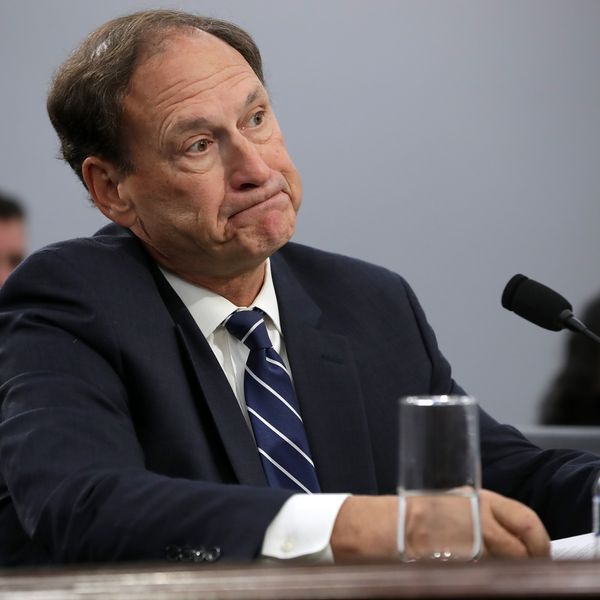Want Your Constitutional Right to Choose? Live in Texas? Get Driving.
'All Texas women have been relegated today to a second class of citizens whose constitutional rights are lesser than those in states less hostile to reproductive autonomy.'
A ruling by the Fifth Circuit U.S. Court of Appeals on Thursday will result in the immediate shuttering of at least thirteen reproductive health and abortion clinics in the state of Texas, forcing millions of women across the state seeking the services of those facilities to now travel possibly hundreds of miles in order to obtain them.
The decision by the court was in reaction to a previous federal ruling which put a stay on implementation of a controversial Texas law, passed by the state legislature last year, which place procedural and infrastructure demands on all abortion clinics that most could not meet. Those restrictions included making sure all physicians at those clinics had admitting privileges at a local hospital and required the clinics themselves to be upgraded with expensive building requirements that were, for most, impossible to meet. Though the still law faces legal challenges, Thursday's ruling means that until its ultimate fate is decided--likely by the U.S. Supreme Court--the new policies will now be implemented and the clinics will close immediately.
Women's health advocates and defenders of the right to choose were infuriated by the court's decision.
"Today's ruling has gutted Texas women's constitutional rights and access to critical reproductive health care and stands to make safe, legal abortion essentially disappear overnight," said Nancy Northup, president and CEO of the Center for Reproductive Rights, which brought suit against the state of Texas over the law.
The court's decision, Northrup continued, amounts to judicial endorsement of the same "disingenuous tactic" used by Texas lawmakers who are "undermining women's safety under the false pretext of protecting it."
Though the three-judge panel (consisting of three male justices) acknowledge the argument that the closing of facilities, which they appeared to recognize as the inevitable result of the new statutes, would force an estimated one out six Texas women to travel at least 150 miles in order to obtain their constitutionally protected right to an abortion, the court determined that "This is nowhere near a 'large fraction.'"
Northrup reacted forcefully to that calculation. "Absolutely no woman's rights or access to essential reproductive health care should be determined by her zip code," she said and vowed that her organization and other would continue to fight what has become a trend of anti-women and anti-choice legislation nationwide.
According to the Washington Post:
The ruling is not a surprise coming from the Fifth Circuit, one of the most conservative federal appellate courts. It previously sided with the state in a challenge to another provision of the law that requires any physician performing an abortion to have active admitting privileges at a hospital within 30 miles of the location where the abortion is performed.
Two of the three judges were appointed by Republican presidents. The third judge, Stephen A. Higginson, was appointed by President Obama. He agreed with the other judges, but would have given exception to two clinics, one in El Paso and one in McAllen.
In all, 80 percent of Texas's abortion clinics serving 5.4 million women of reproductive age have closed since the law took effect. All of the clinics west and south of San Antonio have closed, leaving a large swath of the state without abortion services. Residents of the Rio Grande valley will be at least 230 miles from the nearest abortion clinic.
An Urgent Message From Our Co-Founder
Dear Common Dreams reader, The U.S. is on a fast track to authoritarianism like nothing I've ever seen. Meanwhile, corporate news outlets are utterly capitulating to Trump, twisting their coverage to avoid drawing his ire while lining up to stuff cash in his pockets. That's why I believe that Common Dreams is doing the best and most consequential reporting that we've ever done. Our small but mighty team is a progressive reporting powerhouse, covering the news every day that the corporate media never will. Our mission has always been simple: To inform. To inspire. And to ignite change for the common good. Now here's the key piece that I want all our readers to understand: None of this would be possible without your financial support. That's not just some fundraising cliche. It's the absolute and literal truth. We don't accept corporate advertising and never will. We don't have a paywall because we don't think people should be blocked from critical news based on their ability to pay. Everything we do is funded by the donations of readers like you. Will you donate now to help power the nonprofit, independent reporting of Common Dreams? Thank you for being a vital member of our community. Together, we can keep independent journalism alive when it’s needed most. - Craig Brown, Co-founder |
A ruling by the Fifth Circuit U.S. Court of Appeals on Thursday will result in the immediate shuttering of at least thirteen reproductive health and abortion clinics in the state of Texas, forcing millions of women across the state seeking the services of those facilities to now travel possibly hundreds of miles in order to obtain them.
The decision by the court was in reaction to a previous federal ruling which put a stay on implementation of a controversial Texas law, passed by the state legislature last year, which place procedural and infrastructure demands on all abortion clinics that most could not meet. Those restrictions included making sure all physicians at those clinics had admitting privileges at a local hospital and required the clinics themselves to be upgraded with expensive building requirements that were, for most, impossible to meet. Though the still law faces legal challenges, Thursday's ruling means that until its ultimate fate is decided--likely by the U.S. Supreme Court--the new policies will now be implemented and the clinics will close immediately.
Women's health advocates and defenders of the right to choose were infuriated by the court's decision.
"Today's ruling has gutted Texas women's constitutional rights and access to critical reproductive health care and stands to make safe, legal abortion essentially disappear overnight," said Nancy Northup, president and CEO of the Center for Reproductive Rights, which brought suit against the state of Texas over the law.
The court's decision, Northrup continued, amounts to judicial endorsement of the same "disingenuous tactic" used by Texas lawmakers who are "undermining women's safety under the false pretext of protecting it."
Though the three-judge panel (consisting of three male justices) acknowledge the argument that the closing of facilities, which they appeared to recognize as the inevitable result of the new statutes, would force an estimated one out six Texas women to travel at least 150 miles in order to obtain their constitutionally protected right to an abortion, the court determined that "This is nowhere near a 'large fraction.'"
Northrup reacted forcefully to that calculation. "Absolutely no woman's rights or access to essential reproductive health care should be determined by her zip code," she said and vowed that her organization and other would continue to fight what has become a trend of anti-women and anti-choice legislation nationwide.
According to the Washington Post:
The ruling is not a surprise coming from the Fifth Circuit, one of the most conservative federal appellate courts. It previously sided with the state in a challenge to another provision of the law that requires any physician performing an abortion to have active admitting privileges at a hospital within 30 miles of the location where the abortion is performed.
Two of the three judges were appointed by Republican presidents. The third judge, Stephen A. Higginson, was appointed by President Obama. He agreed with the other judges, but would have given exception to two clinics, one in El Paso and one in McAllen.
In all, 80 percent of Texas's abortion clinics serving 5.4 million women of reproductive age have closed since the law took effect. All of the clinics west and south of San Antonio have closed, leaving a large swath of the state without abortion services. Residents of the Rio Grande valley will be at least 230 miles from the nearest abortion clinic.
A ruling by the Fifth Circuit U.S. Court of Appeals on Thursday will result in the immediate shuttering of at least thirteen reproductive health and abortion clinics in the state of Texas, forcing millions of women across the state seeking the services of those facilities to now travel possibly hundreds of miles in order to obtain them.
The decision by the court was in reaction to a previous federal ruling which put a stay on implementation of a controversial Texas law, passed by the state legislature last year, which place procedural and infrastructure demands on all abortion clinics that most could not meet. Those restrictions included making sure all physicians at those clinics had admitting privileges at a local hospital and required the clinics themselves to be upgraded with expensive building requirements that were, for most, impossible to meet. Though the still law faces legal challenges, Thursday's ruling means that until its ultimate fate is decided--likely by the U.S. Supreme Court--the new policies will now be implemented and the clinics will close immediately.
Women's health advocates and defenders of the right to choose were infuriated by the court's decision.
"Today's ruling has gutted Texas women's constitutional rights and access to critical reproductive health care and stands to make safe, legal abortion essentially disappear overnight," said Nancy Northup, president and CEO of the Center for Reproductive Rights, which brought suit against the state of Texas over the law.
The court's decision, Northrup continued, amounts to judicial endorsement of the same "disingenuous tactic" used by Texas lawmakers who are "undermining women's safety under the false pretext of protecting it."
Though the three-judge panel (consisting of three male justices) acknowledge the argument that the closing of facilities, which they appeared to recognize as the inevitable result of the new statutes, would force an estimated one out six Texas women to travel at least 150 miles in order to obtain their constitutionally protected right to an abortion, the court determined that "This is nowhere near a 'large fraction.'"
Northrup reacted forcefully to that calculation. "Absolutely no woman's rights or access to essential reproductive health care should be determined by her zip code," she said and vowed that her organization and other would continue to fight what has become a trend of anti-women and anti-choice legislation nationwide.
According to the Washington Post:
The ruling is not a surprise coming from the Fifth Circuit, one of the most conservative federal appellate courts. It previously sided with the state in a challenge to another provision of the law that requires any physician performing an abortion to have active admitting privileges at a hospital within 30 miles of the location where the abortion is performed.
Two of the three judges were appointed by Republican presidents. The third judge, Stephen A. Higginson, was appointed by President Obama. He agreed with the other judges, but would have given exception to two clinics, one in El Paso and one in McAllen.
In all, 80 percent of Texas's abortion clinics serving 5.4 million women of reproductive age have closed since the law took effect. All of the clinics west and south of San Antonio have closed, leaving a large swath of the state without abortion services. Residents of the Rio Grande valley will be at least 230 miles from the nearest abortion clinic.

